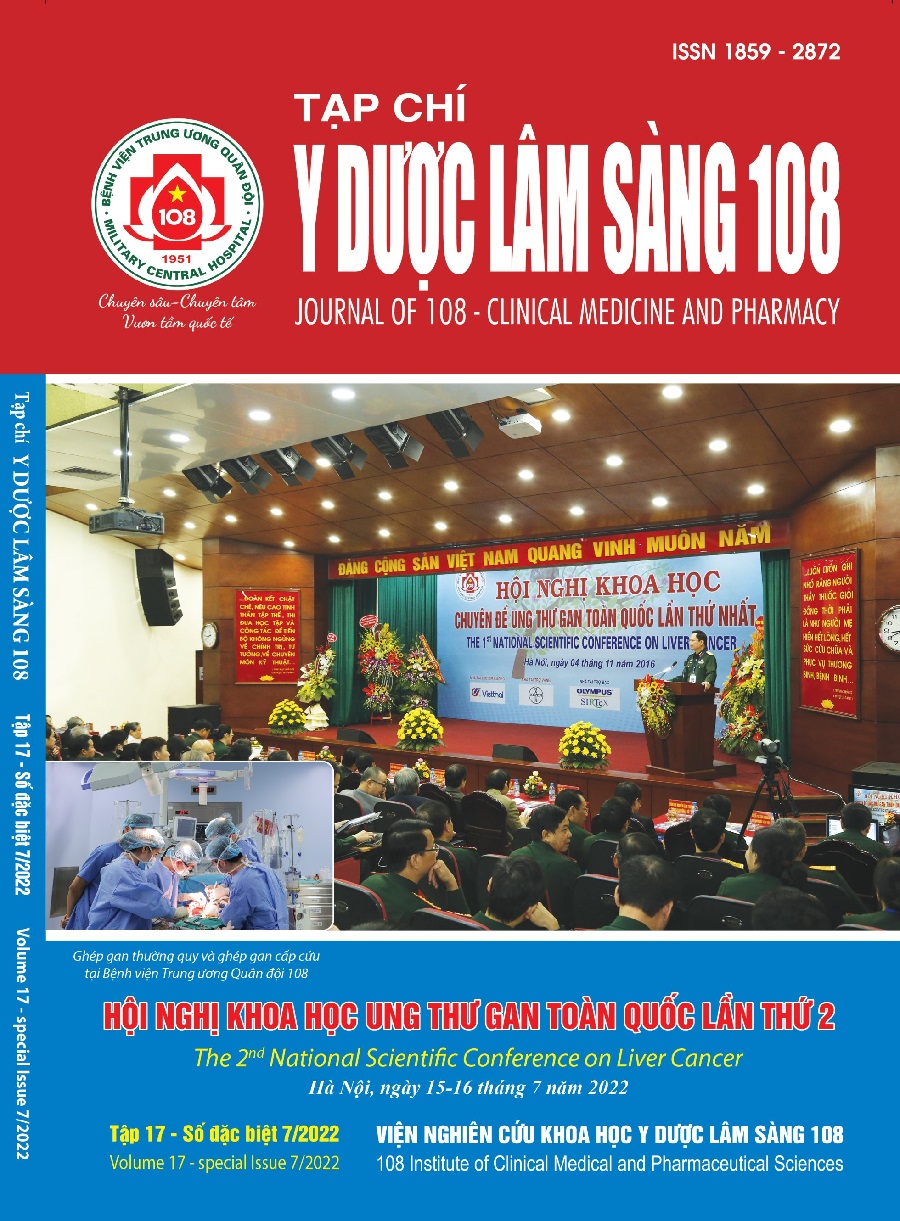Predictive factors of overall survival after liver resection for hepatocellular carcinoma
Main Article Content
Keywords
Abstract
Objective: To analyze several factors affecting Overall Survival (OS) in patients with hepatocellular carcinoma (HCC) of whom liver resection was first treatment. Subject and method: 1704 HCC patients who underwent liver resection as first treatment at Liver Tumor Department, Cho Ray Hospital, Ho Chi Minh City, Vietnam between January 2015 and December 2019 were enrolled in a retrospective study. Those patients were followed up until June 2021, with follow-up time is at least 18 months and at most 78 months. The prognostic significance of viral infection, AFP level, and various pathological factors were evaluated by univariate analysis using the log-rank test and by multivariate analysis using the Cox proportional-hazards regression to determine the related factors affecting OS, and by logistic regression model to determine the prognostic factors affecting OS. Result: Univariate analysis showed that AFP level, vascular invasion, tumor number, tumor size, histological pattern, Edmonson-Steiner staging, tumor necrosis, accompanying resectable metastatic tumors, resection level were related to OS. Multivariate analysis using the Cox proportional-hazards regression showed that tumor number was independent prognostic factor for OS. Conclusion: For HCC patients who received liver resection as first treatment, AFP level, tumor nuber, tumor size, histological pattern, Edmonson-Steiner staging, tumor necrosis, vascular invasion, accompanying resectable metastatic tumors, resection level are related to OS, with tumor number was independent prognostic factor.
Article Details
References
2. You DD et al (2017) Prognostic factors after curative resection hepatocellular carcinoma and the surgeon’s role. Ann Surg Treat Res 93(5): 252-259.
3. Lin CW et al (2018) Significant predictors of overall survival in patients with hepatocellular carcinoma after surgical resection. PLoS ONE 13(9): 0202650.
4. Kudo M (2021) Surveillance, diagnosis, and treatment outcomes of hepatocellular carcinoma in japan 2021 update. Liver Cancer 10: 167-180.
5. Ma L et al (2022) Nomograms for predicting hepatocellular carcinoma recurrence and overall postoperative patient survival. Front. Oncol 12: 843589.
6. Li C et al (2020) Analysis of clinicopathological characteristics and prognosis of young patients with hepatocellular carcinoma after hepatectomy. J Clin Transl Hepatol 8(3): 285-291.
7. Kapiris I et al (2019) Survivin expression in hepatocellular carcinoma. Correlation with clinicopathological characteristics and overall survival. JBUON 24(5): 1934-1942.
8. D’Silva M et al (2021) Pathological prognostic factors for post-resection survival in patients with hepatocellular carcinoma associated with non-alcoholic fatty liver disease. Transl Cancer Res 2021 https://dx.doi.org/10.21037/tcr-21-707.
9. Wei T et al (2020) Tumor necrosis impacts prognosis of patients undergoing curative-intent hepatocellular carcinoma. Ann Surg Oncol 28(2): 797-805. doi: 10.1245/s10434-020-09390-w.
10. Ling YH et al (2020) Tumor necrosis as a poor prognostic predictor on postoperative survival of patients with solitary small hepatocellular carcinoma. BMC Cancer 20: 607.
 ISSN: 1859 - 2872
ISSN: 1859 - 2872
